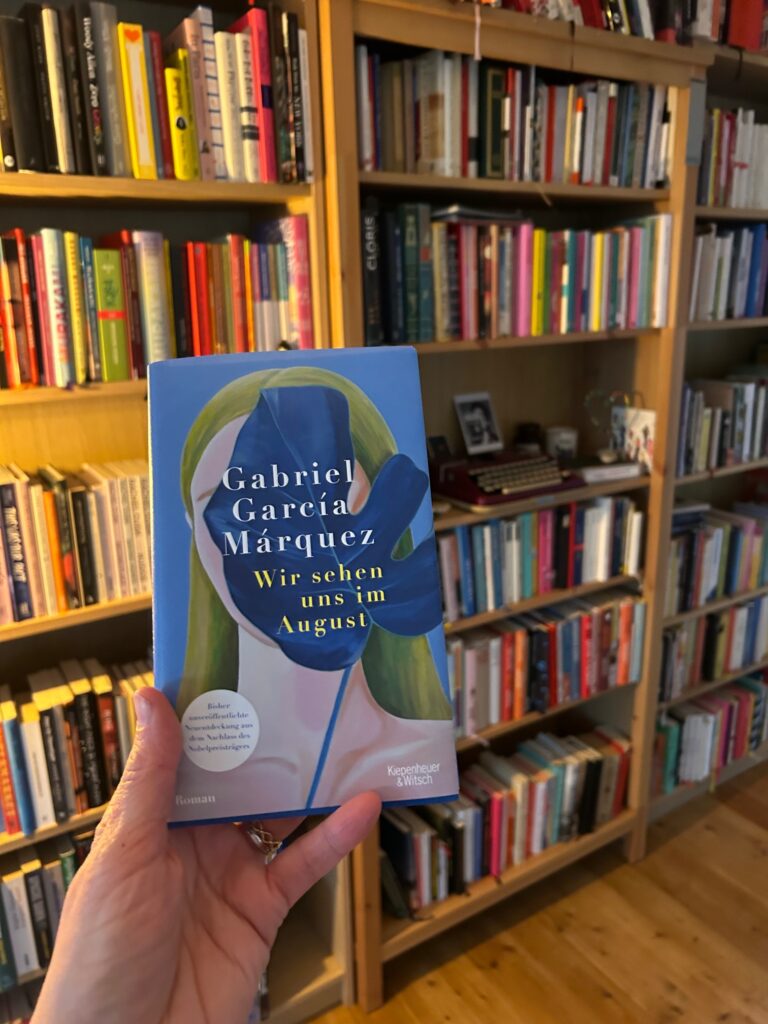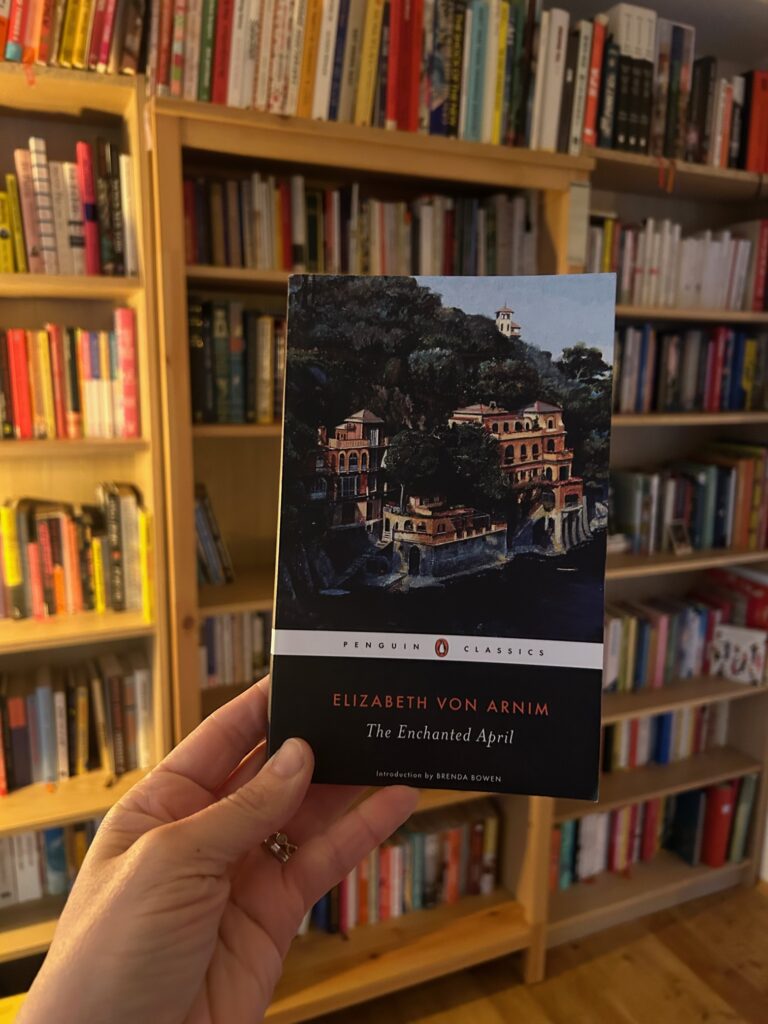.Book Thursday.
“Heroes go forth. To be alive is to go forth.” What this book is about: Johannes is a free dog who lives in a park on a small island. He loves running and keeping track of everything that is happening in the park including human…
“Heroes go forth. To be alive is to go forth.” What this book is about: Johannes is a free dog who lives in a park on a small island. He loves running and keeping track of everything that is happening in the park including human…
Okay, fine. You caught me. Congrats on catching the real Easter Bunny in the act. Yeah, I’m real. As real as Santa Claus. You know what else is real? My hatred of Santa Claus. Seriously, screw that guy. Like his job is any harder than…

“She had repeated this trip every August 16 at the same time, with the same taxi and the same florist, under the fiery sun of that destitute cemetery, to place a bouquet of fresh gladioli on her mother’s grave.”
Until August (Wir sehen uns im August) by Gabriel García Márquez (translated by Anne McLean) revolves around forty-six-year-old Ana Magdalena Bach and her annual visits (on the 16th of August) to the island where her mother is buried. Ana’s itinerary includes a visit to the cemetery where she places a bouquet of her mother’s favorite flowers and indulges in a one-night stand with a different man every year before she returns to her family – her musician husband of over two decades and her two adult children. One of her trysts ends in a humiliating gesture and she carries both the emotional and physical reminder of the same through the years. Every visit to the island and her experiences with the men she meets inspires her to reflect on her actions, her marriage and her family. In sparse prose we are given insight into her motivations, her internal conflict and her desire in a journey of self- explorations with a thought-provoking ending.
A departure (in terms of theme and approach) from the nature of Gabriel García Márquez’s more famous works, this is not the author at his best but for those of us who have enjoyed the author’s work in the past, it won’t be difficult to appreciate the segments that shine with the author’s brilliant writing. But sadly, that is all we can expect from this short novella. I have no doubt had this manuscript been developed into a full-length novel with well-fleshed-out characters, and their motivations and relationships explored deeper; this would have been a worthy addition to the author’s oeuvre.
Please read the Preface to the novel where the author’s sons discuss their decision to publish this novella posthumously despite his wishes to discard the draft manuscript. A segment of this novella (translated by Edith Grossman) was previously published (1999) in the form of a short story.
Releasing a posthumous work by a beloved author will always be a fraught exercise, even more so when the author in question is widely considered one of the 20th century’s best. Pre-publication hype is countervailed with confected outrage about ‘betraying’ the author’s wishes.
Gabriel García Márquez did not think Until August ready to be published, but it is by no means ‘rough’ or incomplete. Per the explanatory notes, this was the fifth draft. It may not have been perfectly polished to the author’s highest standard, and there is a suggestion that it was intended as a part of a larger whole — a cycle of novellas — yet it works just fine as a standalone story and is not some kind of inferior work.
That said, if you have not read García Márquez before, don’t start here. Until August is not characteristic of his famous style, containing no magical realism (although you could argue the book’s ending contains just the slightest hint) or baroque prose flourishes. The style is spare and pared back, the story simple and repetitive in the manner of a piece of music. The overall effect is of old-fashioned charm and elegance mingled with tawdriness, like evening wear scented with sweat and booze. It is a very short work (despite claims of ‘novel’ on the cover), barely cracking 100 pages, and that is with large type and wide margins.
I can remember reading One Hundred Years of Solitude and a switch flipping in my brain: books can be this? It felt like graduating to an entirely different level of reading experience. Until August is not likely to have that effect on anyone (what an incredibly high bar!) It feels like what it is: a minor work of a master.
This article is dedicated to my son Joel. Even though he drives me nuts sometimes, I have to admit that overall he is a very cute, smart, sweet kid. He will be eleven years old this year and leaving elementary school with flying colours to…
I love Japanese authors and their style of writing. Many stories are unique in that they utilize magical realism, a style of writing that combines mystical elements with real-life experiences. Usually, there is a mix of fantasy and reality, which Japanese authors use to explore themes…

*This is how I think it is like working at a condom factory. Reminder: It can always be worse.
EMPLOYEE: You see any good penises lately?
SECOND EMPLOYEE: It’s Friday. So, yes.
EMPLOYEE: Me too. Our whole job is to look at, then discuss penises at a professional level.
SECOND EMPLOYEE: Yes, we’re just professionals who study penises and then have meetings to discuss what we learned about the penises so we can make a better product for penises. Five days a week, 260 working days a year.
EMPLOYEE: Speaking of which, today I’m giving a presentation to our coworkers, who are also penis professionals. I’ll be sharing all of the new things we’ve learned recently about the experience of sex from the perspective of the penis.
SECOND EMPLOYEE: Is the one employee who works in the Vagina Department going to be there?
EMPLOYEE: Unimportant. What are you working on today?
SECOND EMPLOYEE: More research on lambskin and how it fits on different types of penises.
EMPLOYEE: Remember how we discovered that you can use the skin from a lamb to cover a penis?
SECOND EMPLOYEE: Yeah, that was a wild project. Very aggressive timelines. Tons of lambs and penises. I’m really proud of that work.
EMPLOYEE: Our work is the type of thing you can talk about openly with mixed company, such as during dinner with your in-laws, when chatting with a neighbor, or when you’re catching up with parents of children that go to your kid’s school.
SECOND EMPLOYEE: Definitely. I discuss my career working with penises with my father-in-law all the time. He’s one of those technical types of guys who likes discussing cars, sound systems, and the various trajectories of the penis that the skin from a lamb is designed to accommodate during sex.
EMPLOYEE: My dad loves talking about my work with penises too. There must be something about that generation, because they sure do love penises.
SECOND EMPLOYEE: Don’t we all in this line of work? Why else would we dedicate the majority of our lives to the study of penises and penis mechanics?
EMPLOYEE: It’s sure not for the health insurance.
SECOND EMPLOYEE: For me, it’s really about leaving a legacy and doing something that my children and my family can associate me with for the rest of their—hey, look, a penis.
It’s about time I finally cracked this charming little book open. I’ve had it sitting on my bookshelf for a while. The book is a tribute to bookstores, book lovers, and England. This epistolary novel delivered exactly what I expected it to! If it hadn’t…
DAY 1: Entice your partner by dressing in lingerie and performing a striptease. Don’t smile too much — mysteriousness is sexy. Also, when you smile, your partner can see the mouthguard you wear every night to protect your teeth from stress-induced grinding. DAY 2: Find a new place…


My great friend Ursula (movie-night soon!) recommended “The Enchanted April” by Elizabeth von Arnim and I have to say that it was a delightful little story that I highly recommend.
What the book is all about:
Four women, previously unknown to one another, leave a dreary winter in England behind to take a one-month April holiday in a small, charming Italian castle after responding to an advertisement in a newspaper. The descriptions of the landscape are very lush and made me wish that I could make such an escape myself after a seemingly never-ending winter.
“By the end of the week the fig-trees were giving shade, the plum-blossom was out among the olives, the modest weigelias appeared in their fresh pink clothes, and on the rocks sprawled masses of thick-leaved, star-shaped flowers, some vivid purple and some a clear, pale lemon.”
The novel is also sprinkled with humor throughout as the four very different personalities either bluntly clash with one another or surreptitiously try to avoid one or another of the group. I often found myself smiling at some of their little antics and remarks. Each woman begins with her own struggle, discontent, and preconceived notions of what is expected of her as a female member of society.
Lotty Wilkins and Rose Arbuthnot lived a life of relative obscurity in the Hampstead section of London. Both were virtually ignored by their husbands and had the longing to get away from it all. One day, Lotty Wilkins noticed an advertisement in The Times to rent an Italian villa named San Salvatore in April for 60 pounds. Mesmerized by the idea she recruits Arbuthnot to join her. Later, the women ask Lady Caroline Dester and a Mrs Fisher to join them as well, making the pair into a foursome, and, more importantly, making the castle rental into an affordable getaway.
Even though Wilkins and Arbuthnot made the initial arrangements, Mrs Fisher and Lady Caroline shrewdly arrive at the castle first to claim the better rooms for themselves. The latter two women enjoy a higher standard of living than the former and want to ensure that they have an enjoyable holiday. Almost instantaneously, San Salvatore works its magic on all four women. An air of happiness overtakes them and rather than being bitter with their station in life, they talk of love being in the air. Wilkins and Arbuthnot originally came to the castle to get away from their husbands, but within a week, both women write their husbands asking them to join them in this enchanting setting.
Within the month, all four women are the best of friends, although this takes time, especially with Mrs Fisher. Mrs Fisher, the elderly widow, leaves England for Italy with the notion that “Hardly anything was really worthwhile, except the past… She had not come away from these friends (in London), these conversable ripe friends, in order to spend her time in Italy chatting with three persons of another generation and defective experience; she had come away merely to avoid the treacheries of a London April.”
And finally, the beautiful, unattached Lady Caroline, never without a suitor to her own exasperation, believes “Worse than jokes in the morning did she hate the idea of husbands.”She wishes to be left completely alone and yet she seems to attract everyone to her, and her coldness and biting remarks towards others go unnoticed due to her overwhelming beauty. “People were exactly like flies. She wished there were nets for keeping them off too. She hit at them with words and frowns, and like the fly they slipped between her blows and were untouched.”
Ultimately, no one is immune to the enchantments of Italy and companionship and each undergoes their own individual transformations. They learn the value of friendship and that “Beauty made you love, and love made you beautiful.”
I thought the writing was basic yet descriptive and the plot to be straightforward with few twists and turns along the way. Von Arnim was writing from personal experience and recreated the Portofino castello where she enjoyed a monthlong holiday. This book was originally published within a year of her excursion, so the memories were fresh, especially the descriptions of the sea air and ever changing flowers. These amazing descriptions of time and place ended up working for me much better than the plot developments. I felt it was a breath of fresh air and a great reminder that a little respite and new acquaintances can help immensely to renew a dampened spirit.
I read a bit about the author Elizabeth von Arnim who strikes me as an interesting person. A writer brought up in influential circles, she married no less than five times in her life, and also enjoyed an affair with writer H.G. Wells after he ended his own affair with Von Arnim’s rival Rebecca West. When one of von Arnim’s disastrous marriages ended in 1921, she decided to spend a month at Italian castello Portofino as a way to clear her head. The idea for The Enchanted April has been born.
*which is a gas planet. Ur-anus, gas planet! Get it? Funny! The other day I was out for a walk in the evening and saw this little tiny blue alien sitting close to the freshly plowed field. “What the hell,” I thought. The little creature…